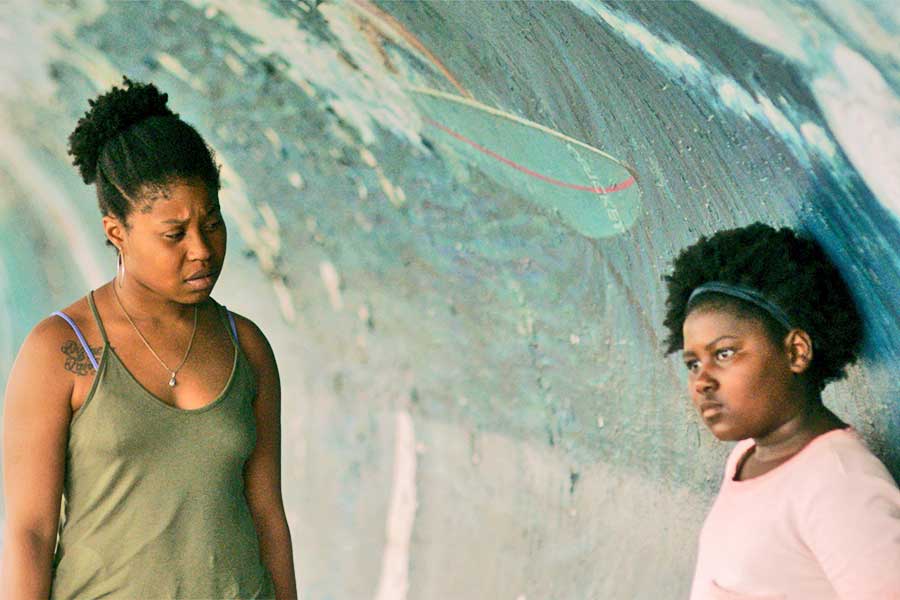Director-cowriter Jordana Spiro makes an impressive feature debut with her gritty, captivating drama, “Night Comes On.” The film, which opens Aug. 3 at the Prince Theater Black Box and on VOD, drops viewers into the life of Angel (Dominique Fishback, in a breakthrough performance).
Two days before she turns 18, Angel is released from a juvenile detention center onto the streets of Philadelphia. She hopes to stay with her girlfriend, Maya (Cymbal Byrd), but that plan quickly hits a snag. She also reconnects with her younger sister, Abby (Tatum Marilyn Hall), who is living in a foster home. Angel wants Abby to help her locate their father (John Jenks) for reasons that soon become clear.
As Angel navigates the obstacles and emotional triggers that arise over 48 hours, this observant drama generates considerable tension.
“I really, truly wanted to give viewers the experience of being strapped to Angel’s back,” Spiro said in a recent phone interview about her deliberately subjective point of view. “I wanted to show the humanity, beauty and despair of the characters. That was the starting point — to be with Angel moment to moment, and be with a character we often push away, cast aside or marginalize. I wanted to capture the poetry of her thinking, the burden of responsibility and her grasping at a sense of purpose when she is told she is worthless by a million different forces.”
Spiro’s film, which won the NEXT Innovator Award at this year’s Sundance Film Festival, succeeds admirably.
Spiro, who is white and heterosexual, chose to tell a story about an African-American lesbian teenager because few films feature characters such as Angel and Abby and their inner lives.
“Buy my husband a drink and he’ll tell you about my panic attacks around telling this story,” she said.
But “Night Comes On” is emotionally honest, and that’s why it resonates.
The director co-wrote the film with Angelica Nwandu, whom she met volunteering for Peace4Kids, an LA-based program for youth in foster care.
Spiro was at a point in her own life where she was lost and searching for meaning and a sense of purpose. She started wondering about self-destructive behavior.
“I’m struggling with feeling so totally lost, and yet I have safety nets around me in all sorts of social and familial ways. So how are these kids coming out of foster care — with all the stigma, obstacles and trauma and zero safety nets — managing? We don’t really get to see this story and the messy, complicated side of those feelings of trying to find love, beauty, self-respect and purpose when you feel you have no support.”
“Night Comes On” also benefits from its Philadelphia and South Jersey settings. Spiro got the idea to shoot in Philly from local filmmaker Jeremiah Zagar. She recounted taking a road trip here and having the story “come alive” en route. The scenery provided “sensorial landscapes” that informed how the characters were feeling. Key scenes in the film take place at the Strawberry Mansion Bridge in Fairmount Park as well as the beaches of South Jersey. The bus shelters, public bathrooms and even the lobby of a building where Angel sleeps one night are freighted with symbolic meaning.
Spiro explained her affinity for the film’s atmospheric locations: “I was interested in setting scenes in transitory spaces — where most people walk through to get to where they were going. Angel lives her life in public and isn’t afforded the luxury of a private space. Buses and doorways were important.”
What these spaces also do is help Angel find herself. “Night Comes On” unfolds as a series of vignettes in which Angel recalibrates her thinking with her every interaction.
“Angel’s scene with Maya shows that she is actually desperate for love,” Spiro explaine. “Viewers feel how much they care for each other — and therein lies hopefulness for Angel. Abby represents life.”
One of the most striking images in the film — and it is seen a few times — has Angel brandishing a gun. It’s a potent visual that Spiro had several concerns about including.
“I was wondering to what degree I was playing on blaxploitation films, Pam Grier, and this iconic imagery which is exploitative and powerful,” said Spiro. “I wanted to play a little with that, but mostly it was important to touch on violence because to pretend it doesn’t exist is untruthful.”
